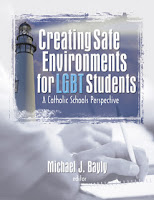
The Wild Reed’s series “Beyond the Hierarchy,” which highlights the liberating insights on sexuality that are emerging and “blossoming” beyond the Vatican, continues with an excerpt from Catholic theologian Joan Timmerman’s 1992 book Sexuality and Spiritual Growth.
 I had the honor of experiencing Joan (pronounced Joanne) as one of my professors at the College of St. Catherine in St. Paul, where I studied in the Masters of Theology program from 1994-1996. In my final year, Joan served as my adviser in the writing of my thesis – one that explored the coming out process of gay men as a spiritual journey.
I had the honor of experiencing Joan (pronounced Joanne) as one of my professors at the College of St. Catherine in St. Paul, where I studied in the Masters of Theology program from 1994-1996. In my final year, Joan served as my adviser in the writing of my thesis – one that explored the coming out process of gay men as a spiritual journey.When people ask me what type of theology most interests me, I reply, “sacramental.” I have Joan to thank for this, as she was the first to provide me with the words, the theological terminology and framework, I’d long desired to put to certain experiences of my journey as a gay Catholic man.
In the following excerpt from her book Sexuality and Spirituality, Joan offers a “morality of responsibility regarding sexual issues,” a morality that, sadly, remains undeveloped within and by the hierarchy of the church’s clerical caste. Joan also presents a number of “steps for practical sexual decision-making,” and offers one of the best definitions of an informed conscience I’ve come across to date. “The importance of a well-formed conscience is obvious,” she writes. “It is the result of education and a habit of right choices. It is more like a developed skill, such as aesthetic taste, than an infused gift.”
____________________________________
A major turning point in the history of sexual morality occurred when Augustine’s theory, that original sin was transmitted by the act of copulation, was accepted as doctrine. This extreme version of one (but not the only) theology of original sin, when taken as the basis for moral teaching, has tended to appeal to those who, for whatever reason, are pessimistic about human motives and the human capacity for responsible action. . . . The hope for moral transformation has no place in their sexual arena. By contrast, recent Roman Catholic teachings regarding politics and economics counts precisely on the human capacity for self-regulation. They envision the possibility of a just and peaceful society and call for voluntary action to make that hope a reality. The political agenda follows from optimism regarding virtue over concupiscence. Again by contrast, the agenda currently reflecting sexual assumptions – especially that on abortion – invokes public condemnation, fear, and legal sanctions, thus revealing its basic pessimism.
So the tragedy is one of omission: for want of a theology of sexuality based on baptismal identity and responsibility, a morality of responsibility regarding sexual issues was left undeveloped. . . .
Adult moral decision-making is integral to adult spirituality, not just as individuation but in the service of community renewal. This is also why morality needs spirituality. As life needs rules, so rules need to be stretched regularly to respond to life. Some regular method needs to be adopted and trusted, so that human forethought and planning are valued within the sexual arena as in other adult decisions.
The current moral theology about sexual expression is showing that some change has come out of listening to the stories of those who express their love sexually. Attempts to distinguish signs of sin from signs of grace show evidence of inductive reasoning and reflection on practice. No longer is it considered appropriate to impose on this experience a model which was created without reference to it and is managed from outside it. For the first time, in the Pastoral Constitution on the Church in the Modern World, marriage is recognized as in its sexuality the singular expression and completion of the spouses’ love, their primary way of performing their intention for total self-gift. Earlier documents would have found in the sexual impulse an inescapably selfish concupiscence asserting itself. But the tension between the magisterium’s ameliorating judgment on sex and the simultaneous tenacity of the ancient bias against sexual expression continues to appear within official and unofficial theological materials.
Within those foundational comments, what I propose is the following set of steps for practical sexual decision-making.
1. Be clear on who you are and what you choose to become. This is the basis of morality. The indicative precedes the imperative. A person starts where she is, with her self-knowledge, her commitments and sense of vocation. Integrity is to choose action continuous with one’s dynamic center.
2. Consult all the sources of wisdom which are available to you. Sources of moral reasoning include Scripture, tradition, communal and personal experience, law, imagination and works of the imagination, moral rules, family of origin with customs and cultural values. Imagine all these as consultants around a table. They do not all have the same deliberative vote, but are assigned priority according to your unique situation and history. All should, however, be attended to.
3. Ask: What are the alternatives to the action presenting itself? If a person thinks she has no alternatives, she is too isolated, too dependent, or has stopped thinking too soon. Then assistance should be sought before proceeding. Action without alternatives is not free, and therefore not a moral choice. It is of course also possible to sabotage one’s own moral agency by deliberately putting oneself in a situation of reduced freedom, for example, by intoxication. This is culpable to the extent that one is aware of it and consents to it. It is always to settle for less than the personal and spiritual adulthood one is destined for. It may be helpful to think in terms of two steps in the deliberate choice of a wrong action, that is, (a) deliberate self-deception and (b) action on the self-deception.
4. What are the consequences for the primary participants? For their wider network of relationships? For society as a whole? Usually the consequences are not between good and evil but between variations or degrees of the good. Moreover, one is aware that the long-term consequences of an action are not always immediately visible and the short-term consequences may be overturned. Here one’s “hierarchy of values” becomes pertinent.
5. What choice, given the self-understanding, data, and the evaluation of consequences, will I make? A choice is not a further step beyond reasoning; it is choosing to stop the reasoning process by the intervention of the will in order to get on with what life requires, that is, action. The alternative to making an imperfect choice is worse: it is not to act at all, which is in effect never to become a moral agent, a fully functioning spiritual person.
6. Am I at peace with this decision? To act out of an unresolved doubt or a troubled conscience is destructive to the person. One can identify a right choice in advance of the action by the peace of mind and soul the decision brings, and a wrong choice by the guilt in initiates. One should of course be sure by consulting of sources (step 2 above) that one is not acting out of false conscience, scrupulosity, or unhealthy guilt. Anxiety (What would my mother say?) or bravado (I wish X could see me now!) might indicate such unreadiness to take this action because it shows a morbid excitement rather than a sense of legitimate pleasure in expressing one’s deepest self. The importance of a well-formed conscience is obvious. It is the result of education and a habit of right choices. It is more like a developed skill, such as aesthetic taste, than an infused gift. Though one should never act in bad faith, there comes a time when the moral calculus must end, and one can act, in good faith, though not always with complete certainty. Then faith provides the certainty that even when wrong choices are made in good faith, the person’s spirituality is not diminished but can grow. God’s forgiveness never fails. As Julian of Norwich wrote, “There is no wrath in God.” When people have difficulty believing in the forgiveness of God and others, it may well be because they have not yet been able to forgive themselves. This takes us back to step 1; What do I wish to become?
– Joan Timmerman
Sexuality and Spiritual Growth
pp. 123-125
Sexuality and Spiritual Growth
pp. 123-125
 Above: Joan Timmerman (seated at front left) and my classmates
Above: Joan Timmerman (seated at front left) and my classmatesat the College of St. Catherine – St. Paul. I took this photo on the
last evening of class in the fall semester of 1995.
See also the previous Wild Reed posts:
• Beyond the Hierarchy (Part 1)
• Beyond the Hierarchy (Part 2)
• The Question of an "Informed" Catholic Conscience
• Joan Timmerman on the Sexuality of Jesus
• In the Garden of Spirituality – Joan Timmerman (March 2007)
• In the Garden of Spirituality – Joan Timmerman (September 2008)
• Joan Timmerman on the "Wisdom of the Body"
Opening Image: Michael J. Bayly.






















No comments:
Post a Comment